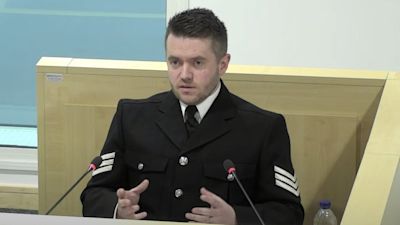Manchester Arena Inquiry: Police sergeant said he was 'ill-equipped' to save youngest victim

Warning: The evidence in this story is distressing
A police sergeant from Greater Manchester Police has said he was "ill-equipped" to deal with those injured at the Arena and was frustrated by the lack of paramedics in the City Room.
Sergeant Leon McLaughlin described the moment he arrived at the arena and the assistance he gave to Saffie-Rose Roussos.
Saffie-Rose, who was eight-years-old and from Leyland, was in the Arena's City Room, with her mother Lisa and sister Ashlee Bromwich, five metres from the bomber.
Sgt McLaughlin said he arrived at the Arena at 10:45pm but could not recall whether there were any ambulances on arrival.
He described that he saw a "huddle of people" around Saffie and heard "so much shrieking".
He admitted that he was "ill-equipped" to manage the injuries and was frustrated by the lack of paramedics in the City Room.
He said: "We were not trained, nor did we have the equipment to provide any meaningful intervention there."
Saffie had already been partially moved onto an advertising board once he had arrived.
He said he believed Saffie was dying and assumed there would be ambulances on Trinity Way, but there were none on arrival.
The inquiry was told that an ambulance was eventually flagged down and Saffie was placed on a stretcher.
Sgt McLaughlin recalled being in the ambulance with her and said that he "felt that she was likely going to die".
The father of Saffie called the emergency services response the 'worst failure' in history as he gave evidence to the inquiry.
The inquiry into the atrocity, on 22 May 2017 bombing that killed 22 people, heard Saffie had suffered multiple fractures, shrapnel wounds and massive blood loss.
The school girl suffered massive blood loss from shrapnel wounds to her legs, caused by the 10.31pm explosion in the City Room foyer of the venue after an Ariana Grande concert.